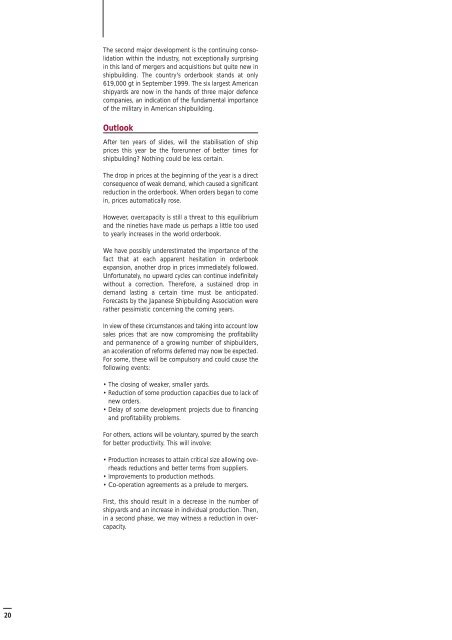Create successful ePaper yourself
Turn your PDF publications into a flip-book with our unique Google optimized e-Paper software.
20<br />
The second major development is the continuing consolidation<br />
within the industry, not exceptionally surprising<br />
in this land of mergers and acquisitions but quite new in<br />
shipbuilding. The country's orderbook stands at only<br />
619,000 gt in September 1999. The six largest American<br />
<strong>shipyards</strong> are now in the hands of three major defence<br />
companies, an indication of the fundamental importance<br />
of the military in American shipbuilding.<br />
Outlook<br />
After ten years of slides, will the stabilisation of ship<br />
prices this year be the forerunner of better times for<br />
shipbuilding? Nothing could be less certain.<br />
The drop in prices at the beginning of the year is a direct<br />
consequence of weak demand, which caused a significant<br />
reduction in the orderbook. When <strong>orders</strong> began <strong>to</strong> come<br />
in, prices au<strong>to</strong>matically rose.<br />
However, overcapacity is still a threat <strong>to</strong> this equilibrium<br />
and the nineties have made us perhaps a little <strong>to</strong>o used<br />
<strong>to</strong> yearly increases in the world orderbook.<br />
We have possibly underestimated the importance of the<br />
fact that at each apparent hesitation in orderbook<br />
expansion, another drop in prices immediately followed.<br />
Unfortunately, no upward cycles can continue indefinitely<br />
without a correction. Therefore, a sustained drop in<br />
demand lasting a certain time must be anticipated.<br />
Forecasts by the Japanese Shipbuilding Association were<br />
rather pessimistic concerning the coming years.<br />
In view of these circumstances and taking in<strong>to</strong> account low<br />
sales prices that are now compromising the profitability<br />
and permanence of a growing number of shipbuilders,<br />
an acceleration of reforms deferred may now be expected.<br />
For some, these will be compulsory and could cause the<br />
following events:<br />
• The closing of weaker, smaller yards.<br />
• Reduction of some production capacities due <strong>to</strong> lack of<br />
new <strong>orders</strong>.<br />
• Delay of some development projects due <strong>to</strong> financing<br />
and profitability problems.<br />
For others, actions will be voluntary, spurred by the search<br />
for better productivity. This will involve:<br />
• Production increases <strong>to</strong> attain critical size allowing overheads<br />
reductions and better terms from suppliers.<br />
• Improvements <strong>to</strong> production methods.<br />
• Co-operation agreements as a prelude <strong>to</strong> mergers.<br />
First, this should result in a decrease in the number of<br />
<strong>shipyards</strong> and an increase in individual production. Then,<br />
in a second phase, we may witness a reduction in overcapacity.


